#emotion analysis
Explore tagged Tumblr posts
Text
#emotions#emotion analysis#emotion ai software#emotion ai#artificial intelligence#ai#technology#ai image#emotion recognition#video emotion#video
0 notes
Text

It's crazy how Dungeon Meshi's manga can feel more cinematic and emotional than the anime to me, even when they're practically the same. Compared to the anime, this moment is such a heartbreaking gut-drop. The way Kui uses negative space and flat compositions to create a sense of horrific stillness is so key.
The way the text (Senshi's monologue) is sequestered to an empty corner of a panel or huddled away from the edge of its text box is not only a great way of showing Senshi's headspace (fearful, isolated, dissociating), but creates a visual representation of pause, as if you hold your breathe after each line. The first panel puts us directly in Senshi's perspective too (compared to in the anime, which puts us as an outside observer over Senshi's shoulder). The detail of the door and bricks so effectively implies that he stared at it for so long, waiting and hoping, that its image is burned in his memory. The wood grain, the brick arch, the number of rivets. The lack of dialogue in the second panel shows a moment of realization too –– "he's dead" (also a great example of the Kuleshov effect). And it's that pause that creates a beat and sets a great rhythm to his headspace, like a music rest: "He never came back." (oh god.) "I'm all alone." Finally, the third panel's negative space, cropping Senshi, shows how truly alone he feels. Without his family, the world ceases to exists. Under shock, he traps himself in a 1-foot radius, too scared to even perceive a world outside its boundaries; a world that can hurt him, kill him, make him disappear with it. There is only his body, the stone beneath his feet and against his back, his thoughts, and that awful bowl of soup.
Even though they're a series of flat images, there's an implicit reading of silence in Senshi's realization and horror. Kui influences your experience to slow down and take your time.
Compare this to the anime, which fills every shot with dialogue. The pacing is fast; we never get to sit in silence like we do with the manga. The horizontal frame allowed the boarders to add Senshi, turning the composition into an over-the-shoulder shot, which takes us out of Senshi's POV. They also added a zoom-out in shot one, which adds unnecessary energy to a very somber scene. The tightening on Senshi as a close-up reaction shot also dulls the moment. In the original panel, Senshi stares ahead at the empty space to his left as a shadow surrounds his mind. It not only shows how Senshi's senses are dulling and his world is shrinking (setting up panel three), but shows how terrified Senshi is of what's in front of him, how the air itself becomes pitch black and opaque, how Senshi is surrendering himself to fear. The pacing is understandable and necessary; this episode packed a lot of story content together. It's just a shame because it really (imo) deflated one of the most nauseating moments in Dungeon Meshi.
#dungeon meshi#senshi#analysis#personal#long post#not art#because comics are inherently more abstract and rule-breaky the format thrives off show don't tell#i think trigger is doing a great job overall but they missed the mark on this scene#for me cinematic storytelling will prioritize rhythm; tension; and silence over plot. that's why the manga feels more “cinematic”#if you've been enjoying the anime i cannot recommend also reading the manga enough. it's a completely different experience with much more#subtext and emotion to draw from
4K notes
·
View notes
Text
Bossware is unfair (in the legal sense, too)
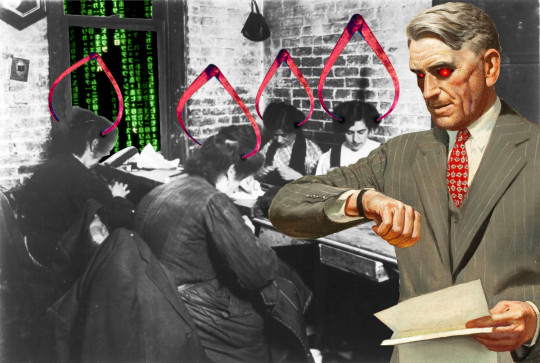
You can get into a lot of trouble by assuming that rich people know what they're doing. For example, might assume that ad-tech works – bypassing peoples' critical faculties, reaching inside their minds and brainwashing them with Big Data insights, because if that's not what's happening, then why would rich people pour billions into those ads?
https://pluralistic.net/2020/12/06/surveillance-tulip-bulbs/#adtech-bubble
You might assume that private equity looters make their investors rich, because otherwise, why would rich people hand over trillions for them to play with?
https://thenextrecession.wordpress.com/2024/11/19/private-equity-vampire-capital/
The truth is, rich people are suckers like the rest of us. If anything, succeeding once or twice makes you an even bigger mark, with a sense of your own infallibility that inflates to fill the bubble your yes-men seal you inside of.
Rich people fall for scams just like you and me. Anyone can be a mark. I was:
https://pluralistic.net/2024/02/05/cyber-dunning-kruger/#swiss-cheese-security
But though rich people can fall for scams the same way you and I do, the way those scams play out is very different when the marks are wealthy. As Keynes had it, "The market can remain irrational longer than you can remain solvent." When the marks are rich (or worse, super-rich), they can be played for much longer before they go bust, creating the appearance of solidity.
Noted Keynesian John Kenneth Galbraith had his own thoughts on this. Galbraith coined the term "bezzle" to describe "the magic interval when a confidence trickster knows he has the money he has appropriated but the victim does not yet understand that he has lost it." In that magic interval, everyone feels better off: the mark thinks he's up, and the con artist knows he's up.
Rich marks have looong bezzles. Empirically incorrect ideas grounded in the most outrageous superstition and junk science can take over whole sections of your life, simply because a rich person – or rich people – are convinced that they're good for you.
Take "scientific management." In the early 20th century, the con artist Frederick Taylor convinced rich industrialists that he could increase their workers' productivity through a kind of caliper-and-stopwatch driven choreographry:
https://pluralistic.net/2022/08/21/great-taylors-ghost/#solidarity-or-bust
Taylor and his army of labcoated sadists perched at the elbows of factory workers (whom Taylor referred to as "stupid," "mentally sluggish," and as "an ox") and scripted their motions to a fare-the-well, transforming their work into a kind of kabuki of obedience. They weren't more efficient, but they looked smart, like obedient robots, and this made their bosses happy. The bosses shelled out fortunes for Taylor's services, even though the workers who followed his prescriptions were less efficient and generated fewer profits. Bosses were so dazzled by the spectacle of a factory floor of crisply moving people interfacing with crisply working machines that they failed to understand that they were losing money on the whole business.
To the extent they noticed that their revenues were declining after implementing Taylorism, they assumed that this was because they needed more scientific management. Taylor had a sweet con: the worse his advice performed, the more reasons their were to pay him for more advice.
Taylorism is a perfect con to run on the wealthy and powerful. It feeds into their prejudice and mistrust of their workers, and into their misplaced confidence in their own ability to understand their workers' jobs better than their workers do. There's always a long dollar to be made playing the "scientific management" con.
Today, there's an app for that. "Bossware" is a class of technology that monitors and disciplines workers, and it was supercharged by the pandemic and the rise of work-from-home. Combine bossware with work-from-home and your boss gets to control your life even when in your own place – "work from home" becomes "live at work":
https://pluralistic.net/2021/02/24/gwb-rumsfeld-monsters/#bossware
Gig workers are at the white-hot center of bossware. Gig work promises "be your own boss," but bossware puts a Taylorist caliper wielder into your phone, monitoring and disciplining you as you drive your wn car around delivering parcels or picking up passengers.
In automation terms, a worker hitched to an app this way is a "reverse centaur." Automation theorists call a human augmented by a machine a "centaur" – a human head supported by a machine's tireless and strong body. A "reverse centaur" is a machine augmented by a human – like the Amazon delivery driver whose app goads them to make inhuman delivery quotas while punishing them for looking in the "wrong" direction or even singing along with the radio:
https://pluralistic.net/2024/08/02/despotism-on-demand/#virtual-whips
Bossware pre-dates the current AI bubble, but AI mania has supercharged it. AI pumpers insist that AI can do things it positively cannot do – rolling out an "autonomous robot" that turns out to be a guy in a robot suit, say – and rich people are groomed to buy the services of "AI-powered" bossware:
https://pluralistic.net/2024/01/29/pay-no-attention/#to-the-little-man-behind-the-curtain
For an AI scammer like Elon Musk or Sam Altman, the fact that an AI can't do your job is irrelevant. From a business perspective, the only thing that matters is whether a salesperson can convince your boss that an AI can do your job – whether or not that's true:
https://pluralistic.net/2024/07/25/accountability-sinks/#work-harder-not-smarter
The fact that AI can't do your job, but that your boss can be convinced to fire you and replace you with the AI that can't do your job, is the central fact of the 21st century labor market. AI has created a world of "algorithmic management" where humans are demoted to reverse centaurs, monitored and bossed about by an app.
The techbro's overwhelming conceit is that nothing is a crime, so long as you do it with an app. Just as fintech is designed to be a bank that's exempt from banking regulations, the gig economy is meant to be a workplace that's exempt from labor law. But this wheeze is transparent, and easily pierced by enforcers, so long as those enforcers want to do their jobs. One such enforcer is Alvaro Bedoya, an FTC commissioner with a keen interest in antitrust's relationship to labor protection.
Bedoya understands that antitrust has a checkered history when it comes to labor. As he's written, the history of antitrust is a series of incidents in which Congress revised the law to make it clear that forming a union was not the same thing as forming a cartel, only to be ignored by boss-friendly judges:
https://pluralistic.net/2023/04/14/aiming-at-dollars/#not-men
Bedoya is no mere historian. He's an FTC Commissioner, one of the most powerful regulators in the world, and he's profoundly interested in using that power to help workers, especially gig workers, whose misery starts with systemic, wide-scale misclassification as contractors:
https://pluralistic.net/2024/02/02/upward-redistribution/
In a new speech to NYU's Wagner School of Public Service, Bedoya argues that the FTC's existing authority allows it to crack down on algorithmic management – that is, algorithmic management is illegal, even if you break the law with an app:
https://www.ftc.gov/system/files/ftc_gov/pdf/bedoya-remarks-unfairness-in-workplace-surveillance-and-automated-management.pdf
Bedoya starts with a delightful analogy to The Hawtch-Hawtch, a mythical town from a Dr Seuss poem. The Hawtch-Hawtch economy is based on beekeeping, and the Hawtchers develop an overwhelming obsession with their bee's laziness, and determine to wring more work (and more honey) out of him. So they appoint a "bee-watcher." But the bee doesn't produce any more honey, which leads the Hawtchers to suspect their bee-watcher might be sleeping on the job, so they hire a bee-watcher-watcher. When that doesn't work, they hire a bee-watcher-watcher-watcher, and so on and on.
For gig workers, it's bee-watchers all the way down. Call center workers are subjected to "AI" video monitoring, and "AI" voice monitoring that purports to measure their empathy. Another AI times their calls. Two more AIs analyze the "sentiment" of the calls and the success of workers in meeting arbitrary metrics. On average, a call-center worker is subjected to five forms of bossware, which stand at their shoulders, marking them down and brooking no debate.
For example, when an experienced call center operator fielded a call from a customer with a flooded house who wanted to know why no one from her boss's repair plan system had come out to address the flooding, the operator was punished by the AI for failing to try to sell the customer a repair plan. There was no way for the operator to protest that the customer had a repair plan already, and had called to complain about it.
Workers report being sickened by this kind of surveillance, literally – stressed to the point of nausea and insomnia. Ironically, one of the most pervasive sources of automation-driven sickness are the "AI wellness" apps that bosses are sold by AI hucksters:
https://pluralistic.net/2024/03/15/wellness-taylorism/#sick-of-spying
The FTC has broad authority to block "unfair trade practices," and Bedoya builds the case that this is an unfair trade practice. Proving an unfair trade practice is a three-part test: a practice is unfair if it causes "substantial injury," can't be "reasonably avoided," and isn't outweighed by a "countervailing benefit." In his speech, Bedoya makes the case that algorithmic management satisfies all three steps and is thus illegal.
On the question of "substantial injury," Bedoya describes the workday of warehouse workers working for ecommerce sites. He describes one worker who is monitored by an AI that requires him to pick and drop an object off a moving belt every 10 seconds, for ten hours per day. The worker's performance is tracked by a leaderboard, and supervisors punish and scold workers who don't make quota, and the algorithm auto-fires if you fail to meet it.
Under those conditions, it was only a matter of time until the worker experienced injuries to two of his discs and was permanently disabled, with the company being found 100% responsible for this injury. OSHA found a "direct connection" between the algorithm and the injury. No wonder warehouses sport vending machines that sell painkillers rather than sodas. It's clear that algorithmic management leads to "substantial injury."
What about "reasonably avoidable?" Can workers avoid the harms of algorithmic management? Bedoya describes the experience of NYC rideshare drivers who attended a round-table with him. The drivers describe logging tens of thousands of successful rides for the apps they work for, on promise of "being their own boss." But then the apps start randomly suspending them, telling them they aren't eligible to book a ride for hours at a time, sending them across town to serve an underserved area and still suspending them. Drivers who stop for coffee or a pee are locked out of the apps for hours as punishment, and so drive 12-hour shifts without a single break, in hopes of pleasing the inscrutable, high-handed app.
All this, as drivers' pay is falling and their credit card debts are mounting. No one will explain to drivers how their pay is determined, though the legal scholar Veena Dubal's work on "algorithmic wage discrimination" reveals that rideshare apps temporarily increase the pay of drivers who refuse rides, only to lower it again once they're back behind the wheel:
https://pluralistic.net/2023/04/12/algorithmic-wage-discrimination/#fishers-of-men
This is like the pit boss who gives a losing gambler some freebies to lure them back to the table, over and over, until they're broke. No wonder they call this a "casino mechanic." There's only two major rideshare apps, and they both use the same high-handed tactics. For Bedoya, this satisfies the second test for an "unfair practice" – it can't be reasonably avoided. If you drive rideshare, you're trapped by the harmful conduct.
The final prong of the "unfair practice" test is whether the conduct has "countervailing value" that makes up for this harm.
To address this, Bedoya goes back to the call center, where operators' performance is assessed by "Speech Emotion Recognition" algorithms, a psuedoscientific hoax that purports to be able to determine your emotions from your voice. These SERs don't work – for example, they might interpret a customer's laughter as anger. But they fail differently for different kinds of workers: workers with accents – from the American south, or the Philippines – attract more disapprobation from the AI. Half of all call center workers are monitored by SERs, and a quarter of workers have SERs scoring them "constantly."
Bossware AIs also produce transcripts of these workers' calls, but workers with accents find them "riddled with errors." These are consequential errors, since their bosses assess their performance based on the transcripts, and yet another AI produces automated work scores based on them.
In other words, algorithmic management is a procession of bee-watchers, bee-watcher-watchers, and bee-watcher-watcher-watchers, stretching to infinity. It's junk science. It's not producing better call center workers. It's producing arbitrary punishments, often against the best workers in the call center.
There is no "countervailing benefit" to offset the unavoidable substantial injury of life under algorithmic management. In other words, algorithmic management fails all three prongs of the "unfair practice" test, and it's illegal.
What should we do about it? Bedoya builds the case for the FTC acting on workers' behalf under its "unfair practice" authority, but he also points out that the lack of worker privacy is at the root of this hellscape of algorithmic management.
He's right. The last major update Congress made to US privacy law was in 1988, when they banned video-store clerks from telling the newspapers which VHS cassettes you rented. The US is long overdue for a new privacy regime, and workers under algorithmic management are part of a broad coalition that's closer than ever to making that happen:
https://pluralistic.net/2023/12/06/privacy-first/#but-not-just-privacy
Workers should have the right to know which of their data is being collected, who it's being shared by, and how it's being used. We all should have that right. That's what the actors' strike was partly motivated by: actors who were being ordered to wear mocap suits to produce data that could be used to produce a digital double of them, "training their replacement," but the replacement was a deepfake.
With a Trump administration on the horizon, the future of the FTC is in doubt. But the coalition for a new privacy law includes many of Trumpland's most powerful blocs – like Jan 6 rioters whose location was swept up by Google and handed over to the FBI. A strong privacy law would protect their Fourth Amendment rights – but also the rights of BLM protesters who experienced this far more often, and with far worse consequences, than the insurrectionists.
The "we do it with an app, so it's not illegal" ruse is wearing thinner by the day. When you have a boss for an app, your real boss gets an accountability sink, a convenient scapegoat that can be blamed for your misery.
The fact that this makes you worse at your job, that it loses your boss money, is no guarantee that you will be spared. Rich people make great marks, and they can remain irrational longer than you can remain solvent. Markets won't solve this one – but worker power can.

Image: Cryteria (modified) https://commons.wikimedia.org/wiki/File:HAL9000.svg
CC BY 3.0 https://creativecommons.org/licenses/by/3.0/deed.en
#pluralistic#alvaro bedoya#ftc#workers#algorithmic management#veena dubal#bossware#taylorism#neotaylorism#snake oil#dr seuss#ai#sentiment analysis#digital phrenology#speech emotion recognition#shitty technology adoption curve
2K notes
·
View notes
Text
I think that way too many people gloss over the reason why exactly those 6 men were such a big deal and a last straw for the crew and Eurylychous. Up to this point Odysseus made mistakes, yes, and people died because of them but never before has Odysseus made such a deliberate sacrifice.
Before this, he was still their Capitan - a bit arrogant, too prone to playing into Gods' Games and with a damnation right on his heels - but still on their side. Not to mention that this saga happens SO soon after Circe Saga, where he CAME BACK for them, put himself in grave danger and risked his return home to save THEM. Since the wind bag fuck up, this crew must have regained so much trust in him, Eurylychous must have felt so indebted and plagued by his own guilt because of his actions in Ocean Saga and Circe Saga. Because despite their doubts and question of How Much Longer Till His Luck Runs Out, their Capitan still came and saved them.
And then the Different Beast happens and it's ruthless and cruel but it's against their enemies, it feels like protection, no doubt. It's their Capitan making sure that they can make it home, that no other monster will follow them and make it impossible.
But then the Scylla happens and it never has been more clearer than there. Eurylychous would not be that furious if he didn't realize and he IS a second-in-command, he is not stupid. Six men who held the torches died and it was by Odysseus' order. This is no longer slaying every foe on the way home, this is Odysseus willing to sacrifice even them. Is it the same capitan who came back for them on Circe's island, is the same who always did everything he could to make sure they all made it back? How Are They Supposed To Trust Him Now?
This situation is so fucked and both sides have their point, I'm so sick of seeing posts putting the full blame on either side. They are all human and stressed and they don't know what to trust, what to do to come back home - and the worst part of it all, they probably never stood a chance.
After all, Zeus has already said they The Blood On Your Hands Is Something You Can't Lose, All You Can Choose Is Whose.
#epic the musical#epic the thunder saga#thunder saga#odysseus#Eurylychous#i have so many emotions towards these guys#i'm half tempted to write another analysis/reconstruction of events for Eurylychous#the way i did for Askeladd#god can i ever write something normal#zeus could you please allow me to stop writing doomed leader-second-in-command realtionships#this is getting so out of hand
1K notes
·
View notes
Text
Okay, so we know that Charles' polo goes red>burgundy>black and back by the end of the season.
Because there's so much going on, I always missed the exact transitions. This time I specifically tracked them down. (Apologies if this has already been done.)
Charles shirt is bright red through the majority of the Devlin House, even in Hope's Diary scene, when he opens up to Crystal.
Even when he first swings at Mr. Devlin and gets knocked back, his shirt is red.

The very subtle shift to burgundy is after he disappears and first reappears in the loop.

It remains burgundy throughout the entire lighthouse leapers episode and beginning of the two dead dragons.
I finally realized the very last moment we see of Charles in the burgundy is with Crystal. She tells him after the confusing makeout night, "But I think we should be friends," and kind-hearted Charles, of course, respects that and puts on a friendly smile.

It's difficult to see in the next scene with him because of his jacket, the angle he sits at on the ladder, and the lighting, but it's immediately after that when we first see him in the black polo.

My brother in death, you are NOT doing well.
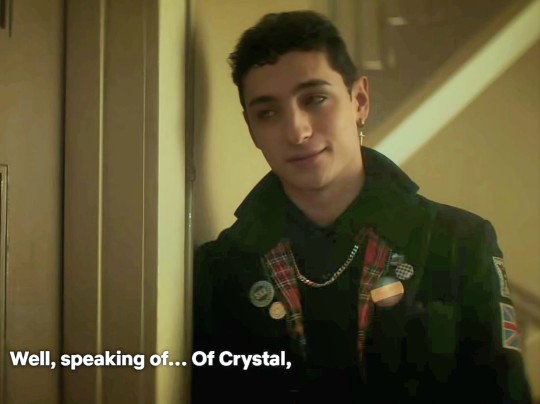
here's another song from Jayden Revri's official Charles playlist, that I think is about this conflict with Crystal:
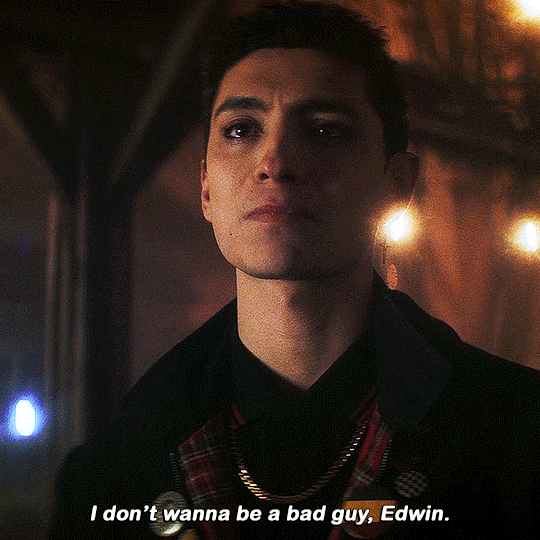
His shirt is still black during the "I don't wanna be a bad guy" scene.
After Edwin's affirmation of Charles' inherent goodness, it is directly after this scene that the shirt goes back to burgundy!!!

He's still wearing the burgundy during the confession:

BUT IT GOES BACK TO BRIGHT RED LITERALLY RIGHT AFTER EDWIN'S CONFESSION AND THEY ESCAPE HELL TOGETHER!
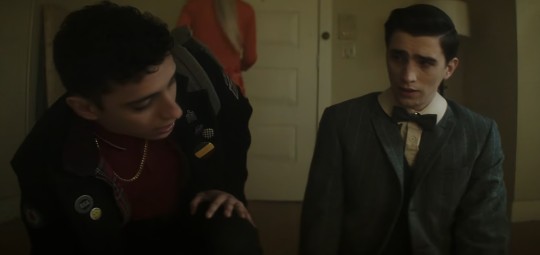

Yo I equally love Cryland and Payneland but the show canonly said "Crystal hit him in the loneliness and Edwin hit him in the loved"
#Spotify#text post#charles rowland#crystal palace#cryland#love cryland but i do accept the misunderstanding conflict angst#costume design#dead boy detectives#dbda#dead boy detective agency#makeout scene#but i think we should be friends for now#the case of the devlin house#the case of the lighthouse leapers#the case of the two dead dragons#scene analysis#reference#if this has already been pointed out sorry but these are for my own notes at least#the case of the creeping forest#the case of the very long stairway#dude i've never been this emotional about a fucking shirt before#this fandom is literally unravelling my sanity#the case of crystal and charles#fandom resource#research
1K notes
·
View notes
Text
Um actually Vander isn't fully gone (the complete proof) (HEAVY SPOILERS)
spoilers for the entirety of arcane s2 obviously watch it if you haven't or don't if you care about your mental health
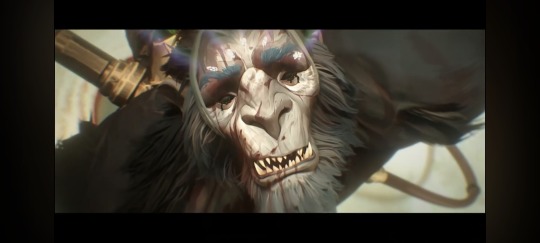
Although we see his memories/emotions get acetoned away in s2e7s final scene, and the following battle with his kids has him attacking them pretty rabidly.
But wait...
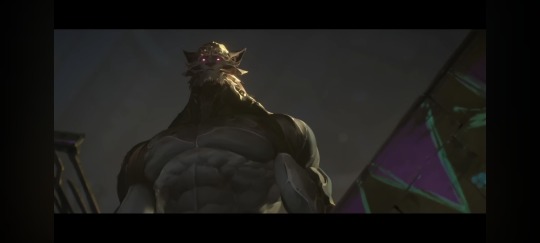
Tumblr compressed this image to hell, so you'll just have to trust me.
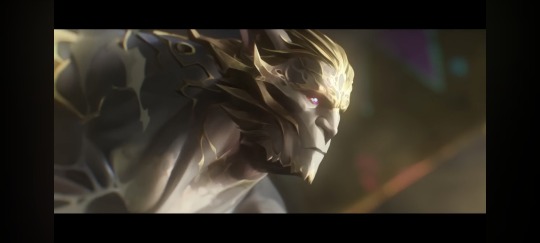
If you look closely as he lunges at Vi and Jinx, a tear appears in his right eye (not previously seen)
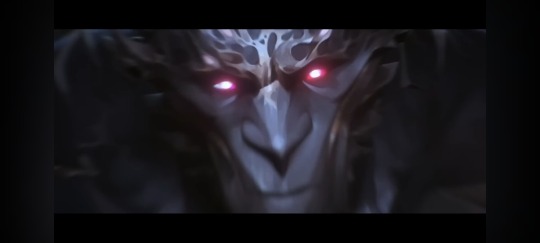
We can see it better after Jinx hits him with her rocket.
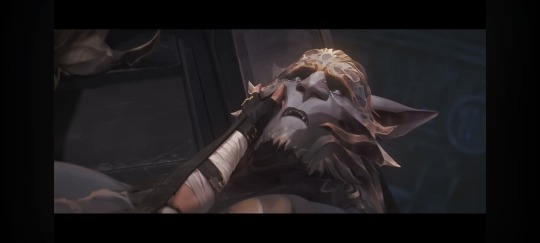
After Vik gets Jayced we see these tears on full display. The size of the tears is significantly larger, so we can assume they were spilled as Warwick corrupted the girls with void magic, indicating some amount of awareness.
Of course immediately after the screencap above Warwick attacks Vi, Jinx does a side slam and the father daughter duo barely get caught by Vi's gauntlet

Jinx and Vander plummet to their presumed deaths (they are both alive, but for drama’s sake, let's pretend). Vander/Warwick doesn't attack Jinx despite her being entirely in his grasp.
He could shred her right then and there. A mindless beast would, he doesn't.
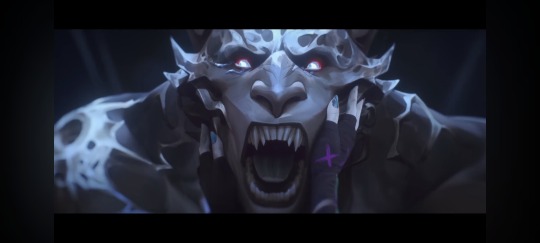
Vander holds Jinx gently, he doesn't dig into her flesh, he just holds her and lets Jinx cup his face.
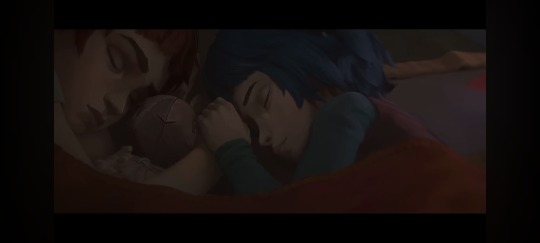
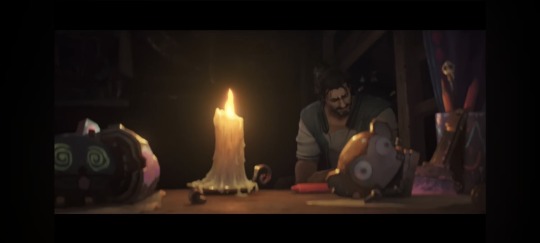
We see a flashback of Vander watching the girls sleep. Since he is the only conscious one in this situation this implies is that it is not Vi's or Jinxes memory, only Vanders.
Reader, you might think, well how the hell does he remember anything didn't he get mind wiped an episode ago. To that I respond I don't fucking know, but arcane is VERY intentional with its details and nothing else makes sense.
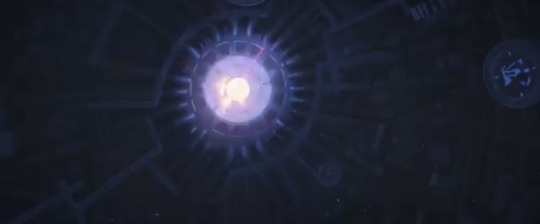
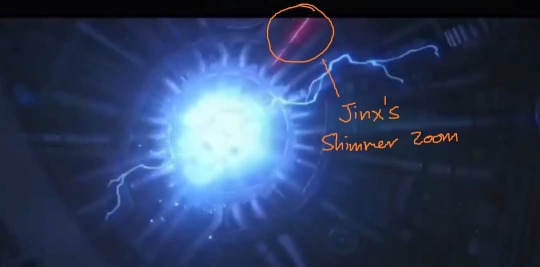
Jinx escapes, this isn't even subtle. She does so BEFORE the bomb blows. In no universe would Jinx break Warwicks grip, hell, she's toast if any stronger character grabs her (fe. Ambessas bodyguard). Do you know what that implies??
Since Warwick wasn't incapacitated at that point, HE WILLINGLY LET HER GO. He used the last shreds of humanity to give his daughter a second chance at life.....
I AM NOT OK
Below there's the more speculative part I'm not sure of.
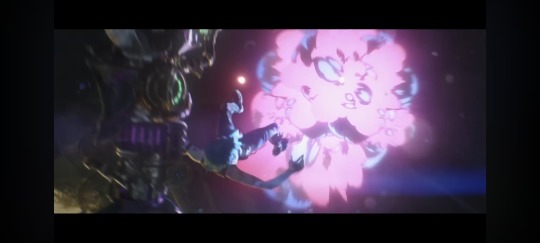
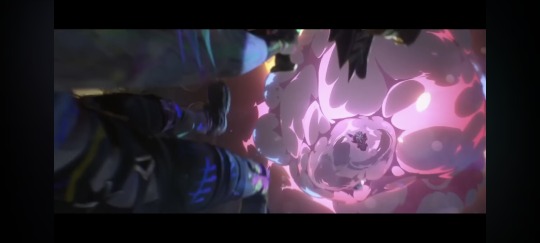
Warwick, unlike Jinx, didn't escape into the air ducts. But we've seen him survive significant explosions in the very same episode, moreover he survived Isha blowing him up with the force of 3 magic orbs, and yet he lived.
This can only imply that Warwick/Vander survived. Of course the previously mentioned flashback shows Vander blowing a candle out which can symbolize his life ending, but I'd say it's more likely a subtle way of showing the destruction of their family unit as it was.
Edit: some people are calling this theory copium I'd agree at first but now that I thought about it more Vanders fate is objectivelly worse than death so i dont know if me being potentially right is a good thing.
(COMPLETE COPIUM BELOW)
I am aware this is complete copium yet maybe Jinx took him wherever the fuck she went on that airship to heal him up while sparing Vi from fighting their unkillable werewolf dad over and over again. Vander is still in there are proved by this long ass post, and I think Jinx knows that. I don't think she could give up on Vander like she wanted Ekko and Vi to give up on her.
□
Cool additional fact pointed out by commenter:
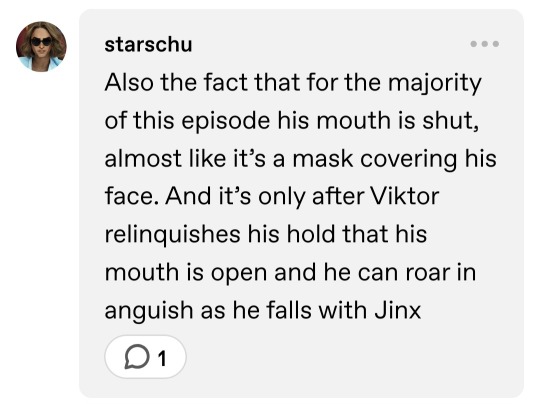
#Arcane#arcane spoilers#arcane season 2#arcane s2 act 3 spoilers#vander#warwick#Vi#Jinx#jinx arcane#Arcane meta#Arcane theory#Arcane analysis#arcane season 2 spoilers#arcane s2#arcane s2 spoilers#Arcane warwick#I am actually a fucking mathematitian can you tell yet im brainrotting about this showwwwww#Arcane vander#Arcane Vi#Arcane Jinx#The emotional damage of watching this season....#brainrot is real#Not copium i swear#Well except the last part ig
532 notes
·
View notes
Text
as a victim it makes me really frustrated when people see yuri briar as incestuous. i'm not a fan of him and he makes me uncomfortable at times so i don't have all the information about him off the top of my head, but i just want to give a bit analysis in defense of him.
he is not in love with, nor attracted to, yor. he has not just childhood trauma but shared trauma with her. she is also his only family member, which is a fact that he is overly aware of and affects his mental state and actions deeply. he has unhealthy attachment and codependency towards her as she is the only family and also the only close connection he has, as well as because she took on a motherly role for him as the oldest sibling. he feels like he needs to work hard to protect her out of his own love and to feel worthy of having received her love.


i feel like people forget because of how he is towards loid that yuri genuinely wanted yor to have a boyfriend. he even offered to introduce her to someone. but even when you objectively want something, that doesn't mean you'll have only positive feelings when it comes to fruition. he wants for yor to be in a happy relationship but at the same time, he does not know loid. his very most important person is living with someone who is a total stranger to him, and didn't tell him about it for a whole year.


that alone would naturally make anyone somewhat suspicious. then you have to consider that seeing them married also hammers into yuri the fact that he cannot always be there with yor. he has to live with the fact that someone he cares about so dearly, his only person, is going to be alone a lot of the time with a man he doesn't know.

this would be difficult for anyone with childhood trauma and trust issues. and yuri isn't just anyone. he is SSS. he is trained to stay suspicious and untrusting, it is a requirement for his job. he spends hours and hours a week dealing with spies and is intimately aware of how well they can blend in and how they can have a completely unknowing family.


that's all, folks. and i don't want to hear any arguments, thanks. if u disagree just keep it to yourself or u will be blocked 🫶

#HATEE when ppl equate codependency to emotional incest U KNOW NOTHING GET AWAY FROM ME#sxf#sxf manga#sxf analysis#sxf yuri#sxf yor#yuri briar#spy x family#spy family
555 notes
·
View notes
Text
A Look at Ratio and Aventurine... and Ratio/Aventurine

I was morally obligated to use this picture.
Anyway, I got an ask about my understanding of Ratio and Aventurine's relationship both in canon and as a ship that I have been holding on to for a while now because... phew, there's like... a lot to talk about there... But I felt I should at least give it a try, so here is my attempt to comment on the intersection of two of Star Rail's most complicated personalities. Long post is longgggg; you have been warned.
First, Aventurine's canon relationship to Ratio:
In the interest of not hitting tumblr's image limit, let's just throw out some of the information we have in one go:

It's pretty complimentary. (Yet somehow...)
The implication of the infamous "Keeping Up with Star Rail" video is that Ratio understands Aventurine better than anyone else, and Aventurine knows this. At the very least, putting all shipping aside, Ratio is the person who can explain Aventurine's behaviors best. He's the person Aventurine chooses do so. This suggests significantly more knowledge of each other's lives than the game first led us to believe.
Other people (read as: my GOAT Owlbert) perceive respect from Aventurine to Ratio, and although I read them as a bit sarcastic, the 2.1 mission logs not only repeatedly confirm that Aventurine views Ratio as smart and reliable, but that Ratio is reliable "as always," again indicating a longer and closer history of collaboration than we get to actively see in game. The devs were working hard to tell us "Penacony isn't Ratiorine's first rodeo," which is interesting--given Topaz's voiceline recommending the Trailblazer avoid working with Aventurine whenever possible, we're led to believe through 2.0 and 2.1 that not many people will willingly work with Aventurine more than once, let alone many times.
While going through psychological scrutiny from the Ghost of Christmas Yet to Come his Harmony-infused self, the "Future" Aventurine suggests that Ratio and Aventurine are quite similar, and that Aventurine puts a surprising amount of trust in Ratio, to be willing to hinge such a dangerous plan on something as untested as Ratio's ability to act. At the very least, Aventurine's own psyche is pondering on Ratio and whether or not their connection has any emotional meaning.
But despite all this evidence suggesting Ratio and Aventurine spend significantly more time with each other than we get to see in game, Aventurine's own thoughts cast strong doubt on whether he and Ratio are actually close.

Aventurine's "About Dr. Ratio" voice line suggests that Aventurine believes Ratio does not particularly like him. He seems to think that Ratio would prefer to stay away from IPC operations where possible, and it's "unfortunate" for Ratio to be stuck with Aventurine as a conversation partner. He's tolerated, rather than enjoyed. His overall impression seems to be that Ratio mostly views them as distant coworkers.
When the "Future" Aventurine suggests Ratio did not betray Aventurine willingly, actual Aventurine immediately pushes back:

(Personally I'm on the fence about whether this was real doubt or just a ploy to continue sussing out Sunday; see my other post about this scene for some more thoughts.)
But if we take this statement to be played straight, it implies that Aventurine doesn't fully believe Ratio will side with him, even (maybe especially) in dire circumstances. If this statement is real doubt, then despite considering Ratio the person who best understands him, despite building an entire life or death gamble around Ratio's loyalty... Aventurine still doesn't think Ratio even likes him.
Aventurine's not stupid or blind, so theoretically he should be able to read the situation better than that. But actually, there's plenty of evidence both in the game and outside it to suggest that Aventurine is not the most accurate judge of his own relationships to others and is a down-right terrible judge of his own worth as a person.

"Future" Aventurine suggests that one of Aventurine's deep inner flaws--the truths that he rejects about himself--is a massive inferiority complex. This is backed up well by the mission text, where Aventurine's thoughts about himself spiral into self-harm, and the scene in the maze, where "Future" Aventurine taunts our Aventurine with the unforgettable fact that his entire life was only worth pennies:

There's also pretty consistent self-deprecation, with both "Future" and real Aventurine noting several times that he's a pathetic mess of a person that other people don't trust or like.

The overall impression 2.0-2.1 left me with is that Aventurine is perfectly capable of respecting and caring for others, but virtually incapable of accepting other people genuinely respecting and caring for him.
Part of this seems to stem from the directly-stated sense that he's a failure whose only worth is in transactional exchanges, using and being used by others (there's so many layers to this--internalized racism even), but I also suspect that much of his inability to accept genuine connection from others is defensive behavior.
Aventurine's true self, Kakavasha, is deeply hidden away, like the ghost of the child that manifests from his Harmony delusion in the Dreamscape. Although Aventurine clings to that person, claiming that he has "never changed," he actively coats over his beliefs, his kindness, and his authenticity with the mask of a "cavalier gambler," with glitz and glamor and showy distractions. No one gets to see Kakavasha. No one gets to know him, because being buried deep in the dirt is the only way to remain untouchable, and fiercely keeping one's distance is the only safe bet. (For both Kakavasha and any fools who would doom themselves by daring to care for him.)
So: Canon is telling us that Ratio is one of, if not the, closest people in the world to Aventurine. But canon is also telling us that that still means absolutely nothing at all, because Aventurine won't let himself be close to anyone living.
Aventurine's senses of self-worth, trust, attachment, and safety have been warped so badly by ongoing and untreated trauma and mental health issues that, at least until the end of 2.1, I just don't think he was capable of even accepting genuine friendship from Ratio, let alone anything more.
(Interesting side note here: Ratio is actually one of the people Aventurine calls "my friend" the least. He only says it directly to Ratio a single time in all of their lines of dialogue across 2.0 and 2.1, and even then, does so only when right outside Sunday's door, while almost certainly being spied upon by the Family. Anyone who knows how often "my friend" is peppered into Aventurine's dialogue otherwise should know that the absence of the phrase is actually pretty telling. It almost feels like canon Aventurine's not even sure he can call Ratio his friend, at least to Ratio's face.)
Which makes Ratio's canon relationship to Aventurine quite sad and ironic:
From start to finish, Ratio canonically esteems Aventurine more highly than almost any other character in the game. I'm not even talking about shipping when I say that there is no character Ratio is closer to in the entire game.

At present, Ratio has only four voice lines about other characters, and of those four, Aventurine's is the only one that isn't someone from the Genius Society. The only one. Ratio's voice lines are also notably, uh, not very complimentary. Herta is "talented but not helpful to others" and "sees no one as her equal" (read as: she's self-absorbed). Screwllum is a "monarch, rather than a genius" (with the vague implications of being a tyrant), and Ruan Mei is overly ambitious and "fooling everyone."
Meanwhile, Aventurine is "our man" (who is "our" Ratio? who?) whose success "can't all be chalked up to luck," implying that part of Aventurine's success must come from skill. Ratio notes that Aventurine questions his own ability... but as far as Ratio's evaluation goes, he seems to doubt that Aventurine will ever experience a downfall. For someone who thinks 99% of the people he meets are mediocre failures scrambling around in the filth of existence, to be recognized as skilled and unlikely to fail is quite obviously glowing praise.
Then, of course, there are numerous moments that echo Aventurine's hints, implying that Ratio spends significantly more time with Aventurine than we see on-screen, that he knows Aventurine extremely well, and, although he tries (vainly) to pretend he isn't, he's clearly quite concerned with what Aventurine thinks of him.

Especially this last one. "No wonder that gambler likes you so much" is pretty intentional on the devs' part, confirming that Ratio and Aventurine are having off-screen conversations we players are not privy to, which obviously would indicate a closer relationship than the in-game cutscenes could cover.
Then, Trailblazer has the option to flat out ask Ratio to "rate" Aventurine. (Star Rail ship bait is not even subtle.)

At first, this line might read as all over the place:
"The bosses say we're partners but I wouldn't say that" -> Read as: Ratio wants people to know how their relationship is classified but doesn't want to admit to being actually invested.
"I see myself as the teacher to everyone I meet" -> Read as: Ratio at least pretends that he doesn't view anyone as his equal; everyone is either above him--geniuses--or below him--students.
"Aventurine is not that bad of a student" -> High praise; even Ratio can't pretend Aventurine's untalented.
"Actually, Aventurine's probably in metaphysical danger" -> Read as: Ratio is aware of the "void" Aventurine is experiencing and his mental struggles.
The ultimate takeaway of Ratio's "rating" actually says more about Ratio than Aventurine. When it comes down to it, Ratio's choice to answer this question for the Trailblazer instead of dismiss it tells us that Ratio has spent time quantifying and trying to define his relationship with Aventurine, is willing to at least discuss that relationship with other people (when we have no evidence he ever discusses any other personal/non-academic matters with anyone), and that Ratio pays attention to Aventurine's mental states.
Canon Ratio is not beating the allegations, I'm afraid.
But actually, I think the biggest tell about Ratio's canon relationship to Aventurine is that Ratio's behavior completely changes the moment Aventurine appears in the game.
In every single one of Ratio's other appearances, two facts are hammered home again and again:
First, Ratio hates interacting with fools and "noisy" people. He wears his plaster bust so that he doesn't even have to see them. Canonically, we're informed by both March 7th and Argenti that Ratio brought and was wearing his headpiece in Penacony. Curiously though...

The players never see it throughout 2.X--probably because 90% of Ratio's scenes are with Aventurine, and Ratio is never shown wearing his bust on screen with Aventurine--even in their very first meeting in the Final Victor lightcone. Aventurine clearly knows of the bust, but despite Ratio verbally going on and on about how Aventurine is the most "flashy" and "devoid of logic" person Ratio knows... the devs deliberately send their message: Ratio has chosen not to cut himself off from Aventurine.
Aventurine can be more "clamorous" than a screaming peacock, but Ratio will still not put up walls against him. This isn't accidental. The devs had every opportunity in the world to go the opposite route and make jokes about Ratio refusing to take the bust off in Aventurine's obnoxious presence; instead they decided that Ratio apparently has a glaring, Aventurine-shaped exception to his "I don't want to perceive you fools or be perceived by you" life rule.
This "willing to tolerate shenanigans only if Aventurine is involved" behavior continues basically throughout all of Penacony's plot. In 2.3 for example, if you turn around and talk to Ratio again on the Radiant Feldspar, he flat out says:

But there's no actual explanation for why he's there in the first place. He mentions he was assigned to watch over "the IPC's ambassadors," which theoretically should apply to Jade and Topaz, yet we never see him interacting with them in any capacity. He's never even shown in the same room as Jade or Topaz, and he's not shown doing any other form of business for the IPC on the Feldspar either. Theoretically, he could have been on the Feldspar to meet regarding the Divergent Universe... except Screwllum wasn't there yet, and Ratio doesn't mention a single word about the Divergent Universe to the Trailblazer.
The only person Ratio talks about in his dialogue on the Feldspar is Aventurine, and the only non-Trailblazer he talks to in 2.3 at all is also Aventurine, replying to him and only him in the group chat.
He looked like he might give it a shot to try to befriend Boothill and Argenti at the end of 2.3... but immediately changes his mind and leaves without saying a word to them.

It's not really a stretch to suggest that the only reasonable excuse for Ratio to attend the party on the Feldspar was if he was there for Aventurine, a behavior that he himself notes is out of character. ("A waste of time" he says, as he stands there anyway.)
But, second and even more importantly: Ratio's single most defining character trait is that he believes people need to pick themselves up. The entire point of his debut appearance in the game was to present his philosophy that if the powerful or privileged intervene to continually "save" the mediocre, ordinary people will never learn for themselves or get the chance to grow. It is in times of desperation, he says, that fools exceed their limits and reach greatness.
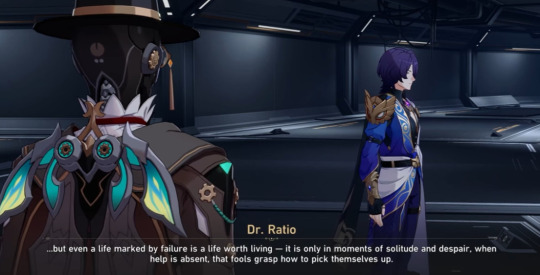
This is why, in 1.6, he insisted on Asta and the Trailblazer being the ones to solve the attacks happening on the space station, without relying on Screwllum or the other geniuses. Although Ratio did actively intervene a little (using the phase flame to save the researchers from death), he did so only from behind the scenes, where his actual help would not be noticed by those affected and where it had no impact on their decision-making or their struggles to solve the mystery.
He let Asta and the Trailblazer panic. He let them flounder. He even deliberately misled them at points, claiming that Duke Inferno must have kidnapped the researchers (when it was actually Ratio himself who re-routed them).
Ultimately, Ratio let Asta and the Trailblazer grow from their experiences.

This is also why he lets the Trailblazer go blazing in to fight Ruan Mei's faux emanator of the propagation, despite knowing that Trailblazer was not actually strong enough to win. Ratio watched and was ready to intervene... but in the end he did not, because it was the Trailblazer's fight to lose.
Ratio's most defining character trait is that he believes standing back and observing is the true kindness, rather than inserting oneself and denying people their autonomy or opportunities to grow.
Buttttt... then there's Aventurine, and suddenly the story is completely different.
Suddenly, Ratio isn't an observer but becomes essential to the plan. He's even walking around making big claims about being the manager of the task, flexing all of his C+ acting ability to actively carry out their mutual ploy.
In 2.3, he claims he was just there to watch, and his Penacony sticker asserts he's only "a supporting character"--yet we have never seen Ratio take a more active role in the entire game. Unlike with the Trailblazer in 1.6, he's not primarily watching events unfold from shadowy corners. He's in Penacony as Aventurine's active partner in crime.
And, even more telling--he later jeopardizes their entire mission just to ask if Aventurine needs help.

What? Huh? The character who is famous for the voice line "You look distressed. Is something troubling you? If so, you can figure it out for yourself" is suddenly offering his assistance entirely unprompted?
The guy whose motto might as well be:
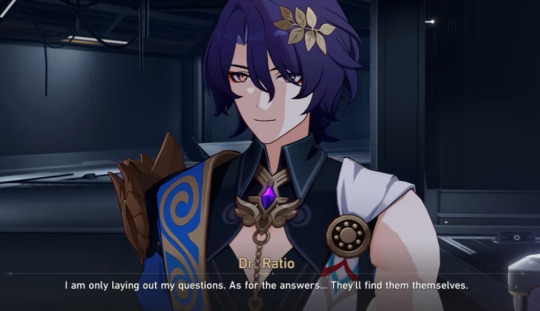
Is suddenly out here throwing his own core philosophy out the window to solve Penacony's mystery for Aventurine and save him from himself in Aventurine's hour of greatest need?

A lot of people get hung up on the second half of Ratio's letter, the part about staying alive, which of course is very sweet. But I think the second half causes people to forget that the first part of Ratio's letter is, quite literally, the answer to Penacony's mystery.
Ratio gave Aventurine the answer.
This is like if your professor just gave you and you alone the score key to the final exam and then turned around to insist he "doesn't play favorites."
Of course, Aventurine is brilliant and didn't need Ratio's answer about dormancy, which makes the fact that Ratio went out of the way to give it to him even more odd. Ratio despises unnecessary repetition. If he wasn't dead worried, he would never have given Aventurine an answer that Aventurine had the power to find on his own.
And, as far as canon tells us, Ratio has never done this for anyone else.
The difference is night and day. It's literally the Gordon Ramsay meme, with everyone else in the entire game being the "fucking donkeys" to Aventurine's "Oh dear. Gorgeous."

So: Even if we entirely put aside shipping, if we look strictly at what we're given in canon:
Ratio treats Aventurine with more respect than he treats most other characters in the game.
He involves himself in Aventurine's struggles in a way that he flat out refuses to do for anyone else.
He compromises his own beliefs purely out of concern for Aventurine.
So, at least as far as we've been shown in canon, it is accurate to state that Aventurine is the closest character to Ratio--and unlike Aventurine (king of self-gaslighting), Ratio isn't even good at acting like he doesn't care.

Frankly, the whole thing is a little sad. Ratio's behavior is so blatantly out of character that a smart person like Aventurine should easily be able to determine it is genuine, but Aventurine's personal hang-ups and ongoing trauma make it difficult for him to even see that authenticity, let alone put faith in it. Even in canon, Ratio is mostly unable to help himself when it comes to Aventurine, which is especially unfortunate given how badly skewed Aventurine's perception of himself and others is by the start of Penacony's story.
PHEW! I finally made it through canon content!
Now there's just... everything else... 🫠

Well, to be honest, I don't think I could ever manage to put all my thoughts about this ship into one post. Probably not even fifty posts.
So rather than trying to say everything there is to say about Ratiorine, what I want to focus on is how fantastically these two characters just fit together. Like puzzle pieces that need to be mirror opposites in order to link, these two characters parallel each other while also perfectly filling in each other's voids. It's some of the best character pair writing I've seen in a long time (though I'm still sort of convinced it was at least 50% sheer luck on Hoyo's part), and my perspective on their ship can really be tied to my underlying perception of Ratio and Aventurine's characters as remarkably similar individuals:
It's obvious that Aventurine is not a healthy or well-adjusted adult man, but like... neither is Ratio.

Both of these characters are "not quite right" marginalized people who, at least in my interpretation, have essentially given up on even faking normality and are now just vaguely play acting their way through being functioning members of a universe that is entirely unequipped to accept them for who they are. In a world full of cyborg cowboys and people with wings growing from their heads, the game still manages to somehow convince us that Aventurine and Ratio are odd ones out.
Kakavasha can't even exist in the dystopian capitalist hellscape of the IPC's machinations. "Aventurine" isn't even a real person, just a never-ending performance, a slick, devil-may-care persona without a single ounce of substance.

Ratio, meanwhile, is a world of one, rejected from the only place he thought he could find validation and acceptance but unable to lower himself to fit in anywhere else.
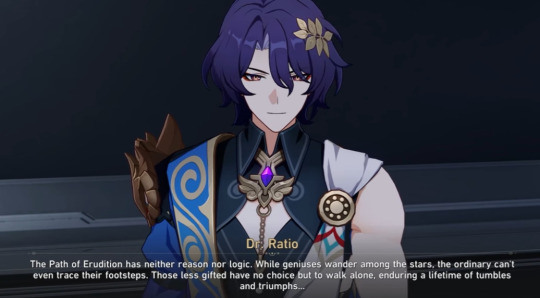
Aventurine is so bad at making genuine connections that he turns everyday conversations into gambles because he doesn't believe people will care enough to keep talking to him without tangible incentive.

Ratio's insistence on treating everyone as students, not as equals, also means he has an excuse to never emotionally engage with anyone he meets. (This is not at all a textbook method of intentional avoidance to prevent any chance of social rejection. Not at all.)
At the end of the day, Aventurine and Ratio both come across as desperately lonely, and so caught up in their own situations that they really don't have the ability to climb out of that hole on their own.
Preventing them from even being able to maintain any form of relationship is also the fact that neither one of them can even find justification. Neither one of them has a reasonable answer to the question "Why am I alive?" anymore, because Aventurine's reason died on Sigonia and Ratio's reason died with an IPC invitation instead of a Genius Society letter. Though their differing perspectives have led them on opposite paths pursuing their own answers to that ultimate question of "Why should I keep living?" (Aventurine was headed toward giving up before the end of Penacony, while Ratio has invented an immeasurable, impossible goal to distract himself from feeling purposeless), both of them are pretty much miserably unfulfilled in their current lives.
They're also both violently allergic to emotional vulnerability and to having any of their flaws or true desires actually be perceived. Both of them put up insanely high walls. Aventurine pushes boundaries with everyone he meets to provoke their hatred in advance, before they can come to disdain him for his "real" flaws. He acts out harmful racist stereotypes to use others' preconceptions for advantage, manipulating every situation he's in--incidentally affirming the stereotypes against his people by doing so.

Ratio puts a physical wall of plaster between himself and others, but the plaster bust actually doesn't have anything on the mental and emotional gymnastics he's engaged in to justify his isolation from the world, doing everything in his power to convince himself that he's isolated by choice, that it's perfectly logical for Veritas Ratio to have nowhere to truly belong, no one to truly belong with. He's so mundane after all. Of course the geniuses don't want him, that's just commonsense. But everyone else is so... different, so foolish, so illogical... It just wouldn't be reasonable of him to try to become one of them either, to be their friend instead of their distant educator. (You know, if you never try to integrate with others, then they can't reject you. Ratio has learned his lesson.)
Somehow, Aventurine and Ratio are two of the most competent and successful people in Star Rail's entire universe and simultaneously also two of the most misfit, reject, dysfunctional messes in the game. Like... Blade has a better support network than Aventurine and Ratio combined. The 7000-pound murderous mech with a disabled, genetically-modified war veteran who never got to live a normal human life hiding inside it is more capable of making friends than Aventurine and Dr. Ratio.
Which is why I love that the devs decided to make their canon backstory: "Some absolute treasures in the IPC and the Intelligentsia Guild had the galaxy-brained idea of pairing Ratio and Aventurine as strategic partners." The game's writing really said: "These two characters are so socially stunted, they have to be assigned a relationship like it's homework."

They may not have it all figured out yet, but the fans see the design: Now that Ratio and Aventurine have each other, they're not alone anymore. I have never seen two characters better fit the "Is anyone going to match my freak?" meme only for the actual answer to be "Yes."
Ratio is "plays chess with himself" levels of loner weird? No problem--Aventurine is "Wanna take bets on who's going to die today?" weirder. Ratio wears a plaster bust to ward off idiots? Aventurine transforms into a monster on command, which is pretty much guaranteed to achieve the same effect.
Ratio wasn't chosen by Nous? That's fine, Aventurine's one job as a "chosen one" was to save his people and now they're all dead. Nobody can keep up with Ratio in conversation? Watch a single comment from Aventurine turn him into a fumbling mess on live television.
Ratio's inability to relate to the experiences and development of any peers his own age have left him extremely isolated and with a permanently scarred sense of self-worth? Wow, I wonder if Aventurine knows exactly what that feels like.
They just... fit.
And, changing focus a little here at the end: While I personally think that recovery from trauma requires internal motivation and self-kindness foremost, I also think that Ratio and Aventurine's relationship should be considered from the perspective of how they help to fill each other's gaps.
Unlike any connection at the Genius Society who will always evoke unpleasant memories of Nous's rejection, Aventurine isn't going to make Ratio feel intellectually inferior. Aventurine has nothing but good things to say about Ratio's intelligence, and it's even apparent that Ratio felt comfortable enough to at least mention his Genius Society woes to Aventurine, something he explicitly does not do with anyone else.

Even when it comes to social interactions, Aventurine isn't going to make Ratio feel inadequate, because honestly? Aventurine's almost as bad at them as Ratio. Aventurine is much better at faking it socially, but when it actually counts? When he's trying to be real with others? A solid 70% of the people who meet Aventurine still end up wanting to strangle him. The guy tried to apologize for threatening to detonate the Trailblazer like a bomb by buying them a model train...
Then there's this:

Aventurine is the only character explicitly called Ratio's equal in game, and more than just treating him respectfully as an equal, Aventurine also exhibits one extreme appeal that no one else in game has ever shown to Ratio: Aventurine makes Ratio feel needed. For Aventurine, Ratio is not a forgettable after-thought as he is to Herta and most of the other geniuses. He's not just "some weird guy who scolds me about school" like he is to the Trailblazer. Ratio's intellect and skill were integral to Aventurine's plan from step one to the very end. Ratio has a place in Aventurine's plots. For a character who directly assesses worth by how beneficial a person can be to others, the fact that Aventurine can make Ratio feel wanted and valued probably produced some of the strongest personal fulfillment Ratio has had in years.
On the opposite side, Ratio's in a unique position. Out of every relevant character in Aventurine's story, Ratio is the only one who has nothing to lose by choosing Kakavasha over "Aventurine." Ratio doesn't profit off Aventurine or take any expensive gifts from him, like the Trailblazer does. He doesn't need Aventurine's luck for anything at all. He'd be able to work for the IPC even if Aventurine wasn't in it. Ratio certainly doesn't want the glitz and glamour of a shallow gambling hustler persona. His work doesn't require Aventurine's continued involvement like Topaz's and Jade's does. He'd probably prefer not to know any Stonehearts at all, thank you for asking.
Outside of deliberate-acting insults about Sigonians for Sunday's sake, we're not told that Ratio has any connections to--and therefore has no preconceived biases against--Sigonians. Being a person who values self-determination and a refusal to live in mediocrity above all else, he would have nothing but esteem for how far Aventurine has managed to come despite the harsh circumstances of his life. Ratio probably wouldn't even think Aventurine's belief in Gaiathra is that strange; one of Ratio's doctorates is actually in theology.
Unlike literally everyone else in the universe who needs "Aventurine," we have every indication that Ratio's respect and admiration will only grow when he finally gets to meet "Kakavasha."

Loneliness, rejection, betrayal, a lack of understanding from others--all of these can leave wounds that only genuine, deep bonds with others can heal.
On death's doorway, in the darkest shadow, when Aventurine had to make the choice between passing on to be with the family that loved him and choosing to return to a reality without them... Ratio's letter was there, telling Aventurine the exact thing he needed to hear to choose life: Someone is waiting for you to come home.
If the resounding rejection of Star Rail's Nihility is belief in humanity's power to make meaning in our own lives through our connections to others, then the ultimate message of Ratio and Aventurine's arc in Penacony is that no one needs to be alone. The world is not as empty as you fear.
And that is a message that Ratio and Aventurine can learn best through each other.
(I just... love them so much...)
#ratiorine#aventio#honkai star rail#aventurine#dr. ratio#golden ratio#ratio/aventurine#there's too many goddamn names for this ship#ship analysis#writing this stuff takes like an hour#but then finding the pictures in the sea of cutscenes#takes like 439575050 years#I'll do it for them#LISTEN#“If we want the rewards of being loved we have to submit to the mortifying ordeal of being known” coded ship for sure#when you and your super hot work husband#want to be real husbands#but you both have so much emotional baggage#the airline is refusing to let you board for your destination wedding#tsk tsk tsk
805 notes
·
View notes
Text
⚠️Spoilers for Look Back but I was initially confused about what Fujino and Kyomoto's relationship had to do with pursuing a career as a mangaka. After thinking about it, I interpret it as a narrative device to represent what will come when choosing to pursue art (of any form, whether it's comics, painting, animation, music, etc.).
Think about it, what's Kyomoto's role in the story? She is what got Fujino to take art seriously in middle school, and what motivated her to continue after she initially gave up. However, she's also the only thing in the story that makes Fujino wish she quit art. First, halfway through 6th grade and then later after her death. She serves as Fujino's motivator and de-motivator.
I think the scene of Fujino wishing that she never told Kyomoto to come out (that pursuing art only led to suffering) represents artists' regrets. We literally look back and see an alternate universe where Fujino never pursued art and it has a happier ending. Anyone that pursues artistic dreams will end up regretting it at some point. It's not easy, any artist will tell you that. The story is saying yes, you probably will end up healthier and more stable by giving up your dreams. Because art is suffering.
But then Fujino enters Kyomoto's room after reading the comic from the alternate reality and all of a sudden we get a montage of the happy memories and accomplishments they had pursuing their dreams together. And we realize that, everything we saw of them in the alternate 'happier' reality pales in comparison to this:


The happiest both of them look in that alternate world is when they finally meet and promise to work together someday. They loved art. They loved each other. Giving up on your dreams means missing out on all of that, and nothing in the world can replace it. Because yes art is suffering, but art is also joy and love.
And so the end of the story where Fujino goes back to work isn't her moving on. She tapes the comic strip in front of her to remind her of Kyomoto, to remind her of why she got into comics in the first place. Basically, Kyomoto IS art to Fujino. A life with her means experiencing both suffering and joy, while the life without her means having none of that.
I might be wrong about this, like maybe Fujimoto just wanted to tell a mangaka story with doomed yuri (valid) HOWEVER i like my interpretation so im sticking with it.
#sorry sorry sorry i just have Thoughts#and none of my friends have watched this movie so I dont have anyone to talk with about it#anyway this movie made me cry and gave me emotional damage. 10/10 highly recommend#i wanted to tag their shipname but i cant bc its literally just fujimoto's name why did he name them after himself im laughing#using a doomed love to represent artists' suffering and joy is genius btw#not everyone knows what its like to pursue art but everyone has that one person they loved (romantically or platonically) and lost#my post#Look Back#look back movie#look back spoilers#look back analysis#ayumu fujino#kyomoto
575 notes
·
View notes
Text
Just going to cry again (see: my previous post about the parallels between the storage room scene and the abandoned factory scene) about parallels and juxtapositions in the store room scene vs the one in Styles bedroom:


Both these scenes have such a tone of desperation and are characterised by an overflowing of emotions, but in drastically opposite directions.
(Note, some of what I say in this post directly relates to concepts and themes I talked about here, so it may not wholly make sense without that context.)
The scene in the storeroom is filled with frustrated desire. Fadel kisses Style because he wants Style's body and also wants to take his frustrations at Style out on his body. He doesn't need to look Style in the eye (and in fact very intentionally only does so only in small snatches) because this isn't about a connection as much as it is about a release. Fadel's kisses come fast, hard, and are intended to bruise more than to adore.
But episode 5's scene is filled with much more quiet and tender sort of desire. Style is kissing Fadel so much more slowly and purposefully. He keeps looking back at Fadel, checking in to see how he feels and whether Fadel is enjoying it. Everything Style wanted in Episode 3, he now gives to Fadel here, pours the secrets of his knowing and choosing Fadel anyway into the way he presses his lips onto Fadel's skin. His kisses linger, they carry a weight but are somehow infinitely gentle still; Style's kisses contain a purpose that Fadel's kisses couldn't in Episode 3 because in all honesty they were relative strangers back then.


There's also the way there's such a ferocity and carelessness in the way Fadel starts the encounter in episode 3 that is juxtaposed beautifully by the slow, tender, almost hesitant way Style slides his lips onto Fadel's. Both of them are in such different headspaces, between these episodes and its especially evident in the way they care so much more about the other person's comfort and how intentionally they showed that to the audience.


There's hunger present in both scenes but what this hunger is focused on is so drastically different. In the storeroom, they're both mainly focused on a physical release; its primal and visceral but lacked emotional resonance. Fadel gives Style what he knows Style wants (that hint of danger, with the hand on his neck), but its not because he really cares about what Style wants on anything more than a physical level. In Style's bedroom, however, Fadel is drunk (intentionally and by his own design) and desperate to open himself up to Style on an emotional level. Meanwhile, Style wants that desperately too, but knows that Fadel shouldn't because of his own terrible secret. So this kiss is what they both will allow themselves - an honesty and a hunger for this deeper connection they can only share in act but not in words.


In the storeroom, Style wants Fadel to want more than his body but knows (or thinks) he can't push for it yet, so he remains passive, lets Fadel do whatever he wants, lets him turn and shove and place Style how he wants because at this point, this is all Fadel will give him. Here, Style is passive in spite of what he wants. But in the bedroom, Fadel is passive because it's what he wants; he wants to let Style do whatever he desires to and with Fadel's body. He wants to lay himself as bare as he possibly can, which is only physical, and so he does.
And because the encounter in Episode 3 lacked that emotional connection, the focus is merely their respective releases. There's a sense of two people trying to find pleasure and 'finish' while remaining emotionally disconnected despite actively having sex with each other. Because in some ways, they didn't really need each other in that moment to get there (there's actually a lot of truth in what Fadel says about it being easier to just jerk off alone). In sharp contrast, the scene in Episode 5 isn't focused on the destination but on the journey. Style is taking his time and Fadel is letting him - Style is choosing to worship Fadel's body, with his fingers, with his lips, to respond to his vulnerability with gentleness and tenderness and adoration. The goal has stopped being about finding a release, it's about allowing both these men to revel in the giving and receiving of pleasure.
The point of these scenes is to show to us the ways in which Fadel and Style have grown to care for and, dare I say it, love each other in ways that are so purposefully portrayed by showing the nature of their physical connection. Because the ways in which these scenes are the same and yet so wholly different showcases how their touches are now no longer merely tied to their senses any longer, but also to their hearts as well.
#when i say i am OBSESSED ugh T_T#what joongdunk did in episode 5 just makes me appreciate and anew how much they're intentionally changing things each time#there's such care taken to portraying the characters growth and change of feelings and we are so blessed to be able to experience it!#the heart killers#the heart killers the series#fadelstyle#stylefadel#joongdunk#joong archen#dunk natachai#thk ep 5#thk ep 3#thk meta#hui talks thk#hui talks thai bl#shoutout to all the gifmakers because this post wasn't nearly as impactful with stills#i do wish there was a better way to search for gifs though TwT#also i've never been a colour analysis girl (because i don't know enough about it; not because i'm not interested...#i mostly don't know where to start)#but wow the lighting feels very intentional too: the cold and clinical shades of blue indicating the emotional distance between them#vs the warm and soft red/orange glow surrounding style's bedroom scene#yeah everything about these scene was so beautifully done and i'm so grateful we get to see it TwT
298 notes
·
View notes
Text
you know i used to think it was weird how sora and roxas have such different personalities for supposedly being 'the same person' but after playing a few games i sort of realized that they do have similar personalities, because roxas acts how sora does when he's under extreme stress.
compare roxas to sora in, say, kh1. that's where a lot of peoples idea of sora's personality comes from. sora is generally very upbeat and optimistic in that game. not very similar to roxas, right?
but let's switch the game and talk about a game where sora is ABSOLUTELY GOING THROUGH IT. chain of memories.
sora's resting state is melancholy in com. he only ever cheers up in short bursts, usually when he's joking around with friends. just like roxas.
he's quick to anger, and tends to lash out at the organization members. best example of this is when larxene makes him 'remember' namine, and he swings at her repeatedly, even after she's gone. he only stops when jiminy is able to snap him out of it.
you know what scene that resembles?
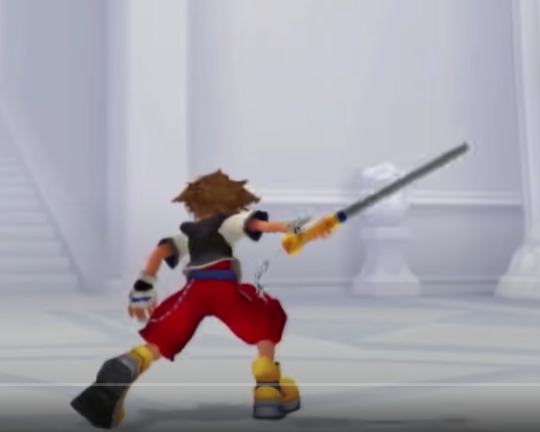

sora, while a bit more on the angry side and less sad, continues to act like this in kh2 when he's in stressful situations. (he also has a tendancy to insult people which, while it's not very related to the point, is very funny and sora saying 'gonna cry?' to xigbar is great.) i cant comment any further than that about kh2 off the top of my head.
so, roxas acts like sora does when he's stressed, right? but why is roxas always acting like that? to which i say, he isnt!
he only ever acts like that when he's also in fucked up and stressful situations, which happens to be a CONSTANT in his life. but when he's hanging out with axel and xion, a decidedly NOT stressful situation, he's a lot more like sora. he's teasing his friends and insulting his coworkers and joking around and acting like a normal kid. not really important, but unless i misremembered some sora lines which is VERY possible, both roxas and sora respond to friendly insults with "oh thanks!" a lot. just a funny little detail that felt relevant.
the biggest differences between roxas and sora boil down to environment and... i dont know how to put it besides volume? roxas is very quiet and tends to keep most of his thoughts to himself, while sora is very loud and expressive in comparison.
there is one other huge difference i noticed, which is less character based and more story. sora wanted to get off destiny islands and explore with his friends, but roxas just wanted routine. sora wants adventure, and roxas wants things to stay the same, for days where he gets off work and eats ice cream with his friends to last forever, to keep having conversations about nothing and watching the sunset. roxas wants normalcy, sora wants excitement. it's just interesting seeing their contrast.
not sure if this is very well said or anything i just wanted to talk about my boys
#random thoughts#its been a while since i got to use that tag eheheh#i bet theres a few people following me who didnt even know i did analysis posts#the fact that sora and roxas grew up in very different environments is pretty important btw#roxas was already a bit quiet and being in a cult where any expression of emotion is immediately shut down probably didnt help#we'll probably never get a good idea of how roxas would be if he was in a normal situation#id say some of the twilight town stuff might be a close estimate but even that doesnt really fit considering all the shit going down#even from the very start hes being accused of theft hes Not doing the best#anyways. sora and roxas are different obviously#but theyre a lot more similar than people really talk about#kingdom hearts#roxas#sora#not rereading this so it might be a little weird and hard to read sorry
2K notes
·
View notes
Text
something i like about nona's family is that they're so like, almost a perfect little nuclear family, and then just. not.
like. pyrrha is "the person who works for her" but also the one who makes breakfast and does the dishes. she's a woman quite literally posessing the body of a cis man and really leaning into the look, honorarily trans in both directions, working construction and shaving in the mornings and braiding nona's hair before school.
and then there's camilla, her...nagging wife? troublemaking older child? roomate who she barely gets along with? the fact that palamedes shares this role is doubly weird. he's a man literally posessing the body of a cis woman, and they're both pyrrha's nagging wife/problem child/roomate. i don't personally believe that anything explicitly or overtly sexual was happening between her and either of them, but i completely understand where people who think that are coming from. and it's fucking weird (affetionate?).
even nona occupies a weird place in this dynamic. like. pyrrha is definitely a parent to her but camilla, who takes a much more active role in her daily life, is...idk. nona has a crush on her and wants to marry her and adopt dogs. camilla's feelings for nona are more parental or older-sisterly, in that she cares for her and wants to protect her, and if her feelings are more complicated than that, it's because of the obvious aspects of the situation which make her extremely sad and apprehensive of the future. her affection for nona seems relatively simple.
and then there's palamedes, who is in theory another parental figure (see: camilla's "i'll talk to your mother later" face, or pyrrha's "you're going to make someone a really irritating wife one day, sextus"), but in nona's view of things he seems like something more along the lines of an older sibling, or perhaps a cool uncle, which is funny because pyrrha arguably treats him more like a spouse than she does camilla.
it's all just so fucking weird and jumbled up on itself. pyrrha will kiss camilla on the head and say "i'll be home for dinner, dear," and then turn around and call both her and nona "daddy's own treasures" (don't get me started). she'll kiss palamedes and camilla both on the mouth and tell them she loves them. she'll tell them she didn't love them well, or even wholesomely, and she won't explain what she means by wholesome.
alecto calls her "mother and father." alecto tells her she should've given into her urges and eaten them.
palamedes and camilla are second cousins and queerplatonic and married and the same person and by the start of the book the lines between them are already dissolving.
nona is so so young and she's so so old and she's not so much younger than camilla and she's older than pyrrha can even comprehend and some days she needs help getting her shirt over her head.
and most importantly they all love each other. it's a weird and confused and unhealthy love. it's a love full of tension and annoyance and fear. it's a love that wants very badly to fit a category and can't. but it's love it's love it's love and even when it's over even when it has nowhere left to go it's not gone it can't be gone. it's over it's done you can't take loved away.
#i started out writing a very normal analysis of their dynamics and got increasingly emotional as it went on#but i kinda like the way it reads now so i'm not gonna edit for tone#enjoy watching me spiral in real time#nona the ninth#nona of new rho#the locked tomb#tlt#my post
2K notes
·
View notes
Text








I don't know why I'm still doing this. - What, drinking? No, hiding it in your footlocker. I'm a captain, for Chrissake.
Dick Winters & Lewis Nixon in BAND OF BROTHERS (2001) ↳ Part Five: Crossroads
#bobedit#bandofbrothersedit#hbowaredit#tvedit#dailyflicks#tvandfilm#hbo war#band of brothers#dick winters#lewis nixon#winnix#part five: crossroads#alcoholism tw#drinking tw#this scene..................#the way they both fall back into humor lest they show their true emotions. they're so in love it makes me sick#and this scene is interesting bc it's the first time we see that dick might actually have a problem with nix's drinking#from a reg media analysis pov it's to demonstrate their moral differences/upbringing and how war brought together these 2 vastly diff men#from an rpfer pov it's to demonstrate how in loooooove dick is with nix and how he deeply cares for himmmmm
224 notes
·
View notes
Text
something about sonic and tails bringing out the best in each other
sonic relies on tails for his ingenuity and problem-solving. tails has his back for every conflict. he was the first to bring out his softer side, the one to make him part of a family. the person he slowed down for. without him, he’d still be on a constant solo drift with no stops. his little bro keeps him grounded (ironic)
all the while tails looks up to sonic in every way. he emulates all his best qualities and has so many unique to himself. caring, heroic, crafty. sonic shows him he doesn’t have to be ashamed of his gifts, inspires him to use his tinkering to help others, and provided him a life full of love and adventure. he named him! without him… :(

well, ill just say i think it’s funny(telling) that in adaptations that propose a universe where sonic doesn’t exist, everything is terrible all around- but tails is the most disconnected from how we know him. other characters change a lot but miles prower… oh man. working for eggman to get approval, like in boom. dark and brooding, like nine. a different name altogether! a general lack of self worth. completely adrift.
not to mention, the first thing sonic does when he arrives in these worlds; look for his genius little buddy <3 & quickly protect him there, too. truly the brothers ever.
#Sonic the hedgehog#miles tails prower#the brothers ever#emotional about them tonight#they need each other :(#sth#Sonic prime#sonic boom#nine sonic prime#these shows may have their faults but they do show this concept nicely 😂#sonic analysis#!! lol#Sonic ova#unbreakable bond
254 notes
·
View notes
Text
"I should have explained myself because maybe then Eleven would have taken me with her, but - I don't know. I didn't know what to say."
That isn't what he said the first time.
"I should have said something. And maybe if I had said that thing, Eleven would want me there with her."
The sentiment of him being with her and knowing/ensuring she's safe is consistent. But he isn't actually repeating himself. There's no need for him to as a person and as a screenwriter, repetition should DEFINITELY be cut.
He's changing. He's brainstorming. He's starting to consider other angles of the "could have"s. The "what if"s.
He starts with "what if I'd just forced an 'I love you'". But I think he likely settles on what we can logically deduce for ourselves in that situation - "I made the right choice prioritizing with what I knew of the consequences at the time".So he changes. He changes.
He changes to "I should have explained myself".
"Explained myself" is NOT the same as "said that thing" and that is VITAL.
I should have just sucked it up and told her I loved her if it meant keeping her safe.
No, I did the best I could with the information I had
I should have told her the truth. Maybe she would have taken it better if I had just told her that I don't love her but it's my fault, not hers. Now she thinks it's hers and that I'm hiding it.
And, perfect timing, Will comes in with (in Mike's pov) "It makes sense why you didn't, though, don't beat yourself up. She was gonna get hurt either way and everything would have been a risk as to how much."
And Mike nods. And the next time we see him, he's saying
"Will she still even want me in her life if I can't give her the love she wants? All I can do now is to make sure she knows it isn't her fault, that's the selfless act I can do for her, but if I confess I don't love her, what other use am I to her? Will doing what's best for her by telling her it's not her fault, it's mine, instead of continuing to lie make me lose her?"
He says "explain". He starts with "maybe I should have changed the 'what'". Then he shifts to "maybe I should changed what she thought of the 'why'". Ironically, his question in the van once he's come to that conclusion is "how?".
The first pitch he makes is "maybe I should have told her I loved her" and Will says "don't worry, you'll have another chance", and he turns away and introspectively reacts with
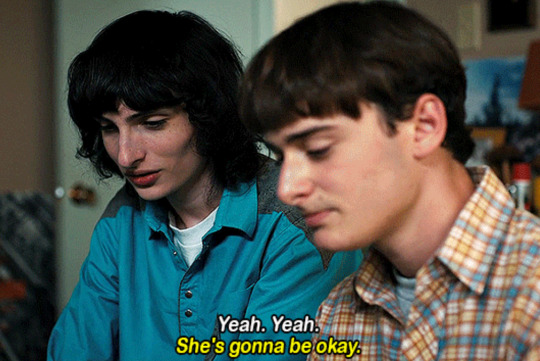
aversion.
But then he says "maybe I should have just explained the real reason behind my actions instead of denying them all together" and Will says "that's a scary thing to do. It's a hard decision. You're doing your best", and he turns away and introspectively reacts with

understanding.
Honestly, being understood. And sometimes that's what you need to find understanding. He's been confused this whole time, that's been his whole thing, but he looks like he's starting to piece something together now - finally. Will put his own feelings into words for him to hear out loud so could finally get them and get them in a validated way.
Instinctively, he knew the first one was easier but wrong. He didn't want to lie to her. Both times Will said "if that's what you want to do, I believe in you", but only once did he agree. He knew it felt like the wrong choice the first time and you can see it. The second time was a new choice he was considering.
And you know what? While we're here. Telling her he loves her: aversion. Telling her the truth: understanding and drive. What happens next?
He expresses "what if when I tell her the truth, as I've decided is the right choice, she appreciates it but doesn't need me for anything else beyond that?" And Will says "she'll stay. You got this.", and he reacts with

Comfort.
He didn't know what to do. Then he did, but he was scared to do it. Then he wasn't so scared anymore.
He's thrilled to see her and forgets for a second but - much like El with Will on roller rink day - is reminded by seeing Will that now that she's actually here, it's real. He's committed to his actions and they're impending.
But he's not so scared anymore. Bravery, though, doesn't mean no nerves. He's hesitant and not happy looking when he talks to her about it first. He tries to lighten the mood - "the whole world went to shit and everything" - and he's watching her reactions like a hawk. It feels like less of a risk now enough that he can do it, but not so little that he isn't scared. Either way though, it's worth the risk for her to know the problem isn't her.
He didn't know what to do. Now he does. He was scared, but he's not as much anymore. Not too much to do it. They're interrupted. Okay, oh well, he'll find another time.
And now to break your heart:
Mike had an idea, Will said it was good, but Mike met that with aversion.
Mike had an idea, Will said it was good, Mike met that with understanding and agreement.
Mike was scared, Will said he had no reason to be, Mike met that with comfort.
(I'm sorry) Mike was scared for El - unrelated - and looked to Will for comfort - as he had every other time - when he tapped him on the shoulder, Will said he should tell her he loves her, and he reacts with
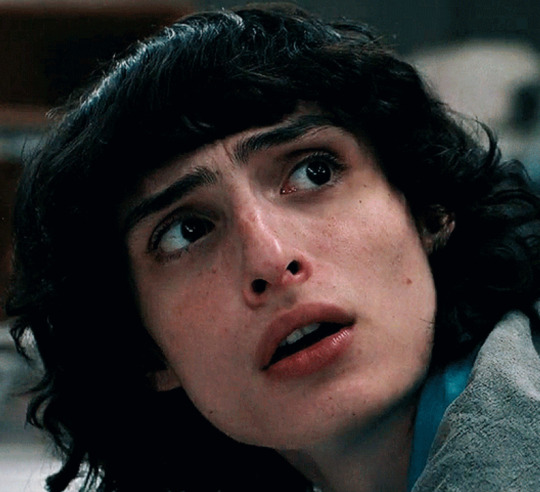
anguish.
This was not Mike's plan.
This was not their plan, so he thought.
Mike's reaction tells us everything about what he knew and what he meant for what's to come. This was not what he meant. That was not what he was going to say. This was not his plan.
And there's that part of you too that always wishes to go back to semi-ignorant bliss. Even if just panicked confusion. Because wasn't it nice: when telling her you loved her evoked this

And not this

Wasn't it nice when you knew...just a little less?
Wasn't it nice, in a way, when you couldn't see the happy ending so clearly?
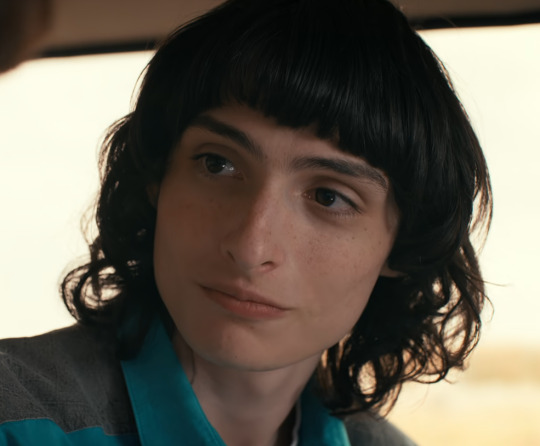
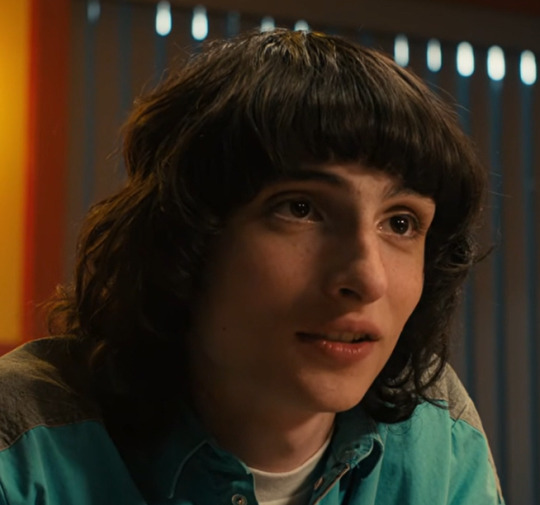
Don't you sort of miss - when you couldn't taste it?
also fuck it for just for that list bit and the bridge of this song here's my illicit affairs edit linked because "you showed me colors you know I can't see with anyone else"
#this was also not my plan (the post being this long that is)#mike wheeler i love you#cartop talk#screenwriting#NO REPEATS!!#no throwaway lines#byler options#heartbroken mike#this is why mike's playlist made me emotional (and a little bit nauseous) the first time i listened through season 4#because all his songs become like 'i'm gonna do it i'm really gonna do it i'm gonna do something for myself for the first time i swear#finally'#and then 4x09 hits#would you believe me if i said the original post ended after the first bullet list lol#and then ended after the first link#but psych#textual analysis#elmike textual analysis#byler#mike wheeler#his hope kills me#byler textual analysis
166 notes
·
View notes
Text

alright,,,,,is this newyears gift,,,,,, i dont no. but maybe it's late enough that i'll be able to forget that i drew this 😁😁😁😁 mttpoly doodles. whoever sees this sees this
#triglycercule kist is real i know someone that will be very happy with this#you dont know how badly i wanted to squeeze a horrorkiller on somewhere focusing on horror's spine#horror sane spin still on my mind. underneath that zipped up jacket is a crop top hand made by horror himself ‼️‼️‼️#auagahhhhhbtheyre all so stupid can you tell i didntbknow what to do for kist (but its nice and i think its cute and a little fitting)#did not finish (or start) the killer analysis so idk anything about him fully still#like this is a tad bit more platonic leaning (something i'd put in my fic) but i still like it#because killer's very aware of everything that will go on and dust has a no murder streak#and something something killer doesnt wanna have to deal with the pain that is dust's emotions#dust knows damn well killer doesnt mean to be nice but he's being nice anyway#and in my eyes dust is nice(ish)est of all of them (and respectful too i think) so he says thank you just because#it takes killer like 3 weeks to figure out how to respond to dust's thank you. i am too tired to figure out what he said in return#NOT EVEN THAT TIRED BUT I GOTTA STAY UP FOR THE SAKE OF STAYING UP‼️‼️‼️‼️ gotta wait until 2am...... then untitled2987601111 awakes#i'm seeing people read horrortale or like mtt stuff and i am very happy ✨✨✨ mtt nation is swell and the three pillars of it are smitten#(for each other)#everyone looks so weirdly good in this but whatever. time to post!#untitled29876011111 gets the full edition 😁😁😁😁😁#tricule art#thankfully its the middle of the night so nobody will see this x3#killer sans#dust sans#horror sans#murder time trio#murder time trio poly#horrordust#kist#horrorkiller#mtt poly
165 notes
·
View notes